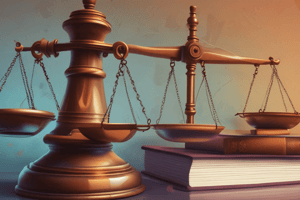Podcast
Questions and Answers
Disclosing embarrassing private facts without consent can lead to legal action under privacy tort law.
Disclosing embarrassing private facts without consent can lead to legal action under privacy tort law.
True (A)
Invasion of privacy torts always relate to publication, excluding broadcasting and Internet posting.
Invasion of privacy torts always relate to publication, excluding broadcasting and Internet posting.
False (B)
Newsworthiness can be a defense in cases of intrusion upon seclusion.
Newsworthiness can be a defense in cases of intrusion upon seclusion.
False (B)
The First Amendment always protects journalists from liability when publishing information from public court documents, regardless of its offensiveness.
The First Amendment always protects journalists from liability when publishing information from public court documents, regardless of its offensiveness.
In the case of Cox Broadcasting v. Cohn, the U.S. Supreme Court upheld the Georgia statute prohibiting the publication of a rape victim's name.
In the case of Cox Broadcasting v. Cohn, the U.S. Supreme Court upheld the Georgia statute prohibiting the publication of a rape victim's name.
A journalist can be penalized for publishing truthful information lawfully obtained if it relates to a matter of public significance.
A journalist can be penalized for publishing truthful information lawfully obtained if it relates to a matter of public significance.
The case of Florida Star v. B.J.F. resulted in a unanimous decision by the U.S. Supreme Court.
The case of Florida Star v. B.J.F. resulted in a unanimous decision by the U.S. Supreme Court.
The U.S. Supreme Court has ruled that the First Amendment protects the publication of illegally intercepted communications, regardless of the journalist's involvement in the interception.
The U.S. Supreme Court has ruled that the First Amendment protects the publication of illegally intercepted communications, regardless of the journalist's involvement in the interception.
In Bartnicki v. Vopper, the Supreme Court ruled that the radio host violated federal wiretapping statutes by airing an illegally recorded conversation.
In Bartnicki v. Vopper, the Supreme Court ruled that the radio host violated federal wiretapping statutes by airing an illegally recorded conversation.
In the case of Veilleux v. NBC, the First Circuit Court of Appeals upheld the jury verdict against NBC for unreasonable publication of private facts.
In the case of Veilleux v. NBC, the First Circuit Court of Appeals upheld the jury verdict against NBC for unreasonable publication of private facts.
Flashcards
Disclosure of Embarrassing Private Facts
Disclosure of Embarrassing Private Facts
Giving publicity to private life matters that are highly offensive to a reasonable person and not of legitimate public concern.
Common-law right of privacy
Common-law right of privacy
The right to be free from unwanted publicity about private affairs that would be offensive to a person of ordinary sensibilities.
Newsworthiness Defense
Newsworthiness Defense
A legal defense against invasion of privacy claims if the disclosed facts are deemed of public interest or concern.
Cox Broadcasting v. Cohn
Cox Broadcasting v. Cohn
Signup and view all the flashcards
Smith v. Daily Mail Publishing Co.
Smith v. Daily Mail Publishing Co.
Signup and view all the flashcards
Bartnicki v. Vopper
Bartnicki v. Vopper
Signup and view all the flashcards
Peavy v. WFAA-TV
Peavy v. WFAA-TV
Signup and view all the flashcards
Study Notes
- This explores invasion of privacy torts related to publication, where newsworthiness can be a defense, raising ethical questions for journalism.
Disclosure of Embarrassing Private Facts
- One is liable for invasion of privacy when giving publicity to someone's private life.
- The matter must be highly offensive to a reasonable person.
- The matter must not be of legitimate public concern.
Highly Offensive
- Kubach, an AIDS patient, appeared on a TV show with his image digitized, but was recognized due to a technical glitch.
- After the incident, Kubach suffered severe emotional distress and social isolation.
- Kubach sued the TV station for disclosure of embarrassing private facts and won a jury award, which was mostly affirmed on appeal.
State Privacy Statutes
- These statutes protect against publishing specific facts like names of juvenile offenders and sexual crime victims.
- They can pose legal and ethical challenges for reporters.
- In Cohn, a reporter disclosed the name of a rape victim, violating a Georgia statute.
- The victim's father sued and initially won, but the U.S. Supreme Court reversed the decision.
- The Supreme Court held that once truthful information is in public court documents, its publication cannot be sanctioned.
- Even with First Amendment protection, journalists must ethically consider publishing embarrassing private facts.
- In Oklahoma, news media defied a court order by publishing the name and photo of a juvenile suspect.
- The U.S. Supreme Court reversed the Oklahoma Supreme Court's affirmation of the judge's order, citing the presence of the press at the hearing with state's implicit approval.
- The Supreme Court protected the publication of a judge's name under investigation, emphasizing public interest in governmental affairs as per Landmark Communications, Inc.
- A newspaper published the name of a juvenile suspect, which was protected due to the information being lawfully obtained and of public significance according to Smith
- The Court also noted the state law was narrow in only restricting newspapers, not other media.
- In Florida Star v. B.J.F., a newspaper published a rape victim's name obtained from a police report available in the pressroom.
- The victim sued and won initially, but the U.S. Supreme Court reversed, citing the accuracy of the report and the lawful acquisition of the name.
- Dissenters argued for protecting victims' privacy and criticized the publication of the victim's name.
Newsworthiness Defense
- The U.S. Court of Appeals addressed a case involving the disclosure of private facts related to a truck driver's drug test.
- The court considered whether personal revelations about Kennedy were in the public interest and found that they were.
- Reporting statistics would have had less impact than including Kennedy's specific results.
- Newsworthiness can defend against accusations of disclosing embarrassing private facts, though it is questionable against intrusion upon seclusion.
Intercepted Communications
- Bartnicki v. Vopper involved a journalist's disclosure of information from an illegal wiretap related to a teachers' contract negotiation.
- A radio talk-show host played a tape of a conversation between union leaders, obtained from an anonymous source.
- The U.S. Supreme Court agreed with the appellate court that the First Amendment protected airing the tapes due to public interest.
- The Court referenced Florida Star v. B.J.F., Landmark Communications, Inc., and Smith
- The negotiations were considered a matter of public concern, and the individuals were involved in public debate.
- Dissenters argued for protecting individual privacy against the broadcast of cellular telephone conversations.
- Newsworthiness may justify disclosing embarrassing private facts.
- Peavy clarifies Bartnicki v. Vopper, stating it only applies if the journalist had no role in the illicit recording.
- A reporter, Riggs, encouraged illegal cellphone recordings from Harman.
- WFAA-TV aired stories based on these recordings, leading to charges against Peavy.
- The appellate court reversed the trial court's judgment, stating WFAA and Riggs had participation concerning the interceptions.
- Unlike the broadcaster in, Riggs and WFAA-TV “had some participation concerning the interceptions” and therefore were covered by the statutes’ prohibitions against use and disclosure of intercepted conversations, the First Amendment notwithstanding.
- Intrusion upon seclusion and disclosure of embarrassing private facts are common privacy lawsuits journalists may face.
Studying That Suits You
Use AI to generate personalized quizzes and flashcards to suit your learning preferences.



